Tinnitus is a common condition characterized by the perception of noise or ringing in the ears, which is not caused by an external sound. It affects millions of people worldwide and can manifest as a variety of sounds, including ringing, buzzing, hissing, or clicking. These sounds may be constant or intermittent and can vary in volume and pitch. Tinnitus can significantly impact an individual’s quality of life, leading to difficulties with concentration, sleep disturbances, and emotional distress.
The causes of tinnitus are diverse and can include exposure to loud noises, age-related hearing loss, ear infections, and ear injuries. In some cases, tinnitus may be a symptom of an underlying health condition, such as cardiovascular disorders, temporomandibular joint (TMJ) disorders, or Meniere’s disease. Understanding the underlying cause is crucial for effective management and treatment.
While there is no cure for tinnitus, various treatment options and coping strategies can help manage the symptoms and reduce their impact on daily life. These may include sound therapy, cognitive-behavioral therapy (CBT), and the use of hearing aids or masking devices. Additionally, lifestyle changes and preventive measures, such as protecting ears from loud noises and managing stress, can help alleviate symptoms.
This introduction explores the nature of tinnitus, its potential causes, and the available treatments, aiming to provide a comprehensive understanding of this prevalent and often challenging condition.
Table of Contents
Types of Tinnitus

Tinnitus can manifest in various forms, and understanding the different types is essential for accurate diagnosis and effective management. Tinnitus is broadly categorized into subjective and objective types, with further subcategories based on the nature and characteristics of the perceived sounds.
1. Subjective Tinnitus
Subjective tinnitus is the most common type and is characterized by the perception of sound in the absence of external noise. It can only be heard by the affected individual and is often linked to auditory system issues.
- Tonal Tinnitus:
- Description: Perceived as a continuous sound with a specific pitch, such as ringing, buzzing, or humming.
- Common Causes: Noise-induced hearing loss, age-related hearing loss, ear infections, and ototoxic medications.
- Pulsatile Tinnitus:
- Description: Rhythmic sound that often matches the individual’s heartbeat. It may sound like a whooshing or thumping noise.
- Common Causes: Vascular abnormalities, such as arteriovenous malformations, high blood pressure, and increased blood flow in the ear.
- Musical Tinnitus:
- Description: Rare form of tinnitus where the individual hears music or singing. This type can be particularly disturbing and confusing.
- Common Causes: Often associated with hearing loss, but the exact cause is not well understood.
- Noise-Induced Tinnitus:
- Description: Typically a high-pitched ringing or buzzing sound resulting from exposure to loud noises.
- Common Causes: Prolonged exposure to loud music, industrial noises, or sudden loud sounds like explosions.
2. Objective Tinnitus
Objective tinnitus is a rare form of tinnitus where the sound can be heard by an examiner through a stethoscope placed near the ear. This type is usually caused by physical abnormalities or vascular issues.
- Vascular Tinnitus:
- Description: Caused by abnormal blood flow in the vessels near the ear.
- Common Causes: Arteriovenous malformations, carotid artery stenosis, and vascular tumors.
- Muscular Tinnitus:
- Description: Results from involuntary muscle contractions in or around the ear.
- Common Causes: Palatal myoclonus (spasms of the muscles in the roof of the mouth), middle ear muscle spasms.
Additional Classifications
- Somatic Tinnitus:
- Description: Tinnitus that changes in intensity or character when there is a movement or manipulation of certain body parts, such as the neck or jaw.
- Common Causes: Temporomandibular joint (TMJ) disorders, cervical spine disorders, and dental issues.
- Neurological Tinnitus:
- Description: Linked to neurological conditions affecting the auditory pathways.
- Common Causes: Multiple sclerosis, acoustic neuroma, and other neurological disorders.
- Central Tinnitus:
- Description: Originates from the central nervous system and not the auditory system.
- Common Causes: Often associated with changes in brain function or structure, but the exact mechanisms are not fully understood.
Tinnitus can present in various forms, each with distinct characteristics and underlying causes. Understanding the type of tinnitus is crucial for accurate diagnosis and effective management. Whether it is subjective, objective, or related to specific physical or neurological conditions, identifying the nature of the tinnitus can help guide appropriate treatment strategies and improve the quality of life for those affected. If you experience tinnitus, consulting with a healthcare provider can help determine the type and underlying cause, leading to better-targeted therapies and interventions.
Symptoms of Tinnitus
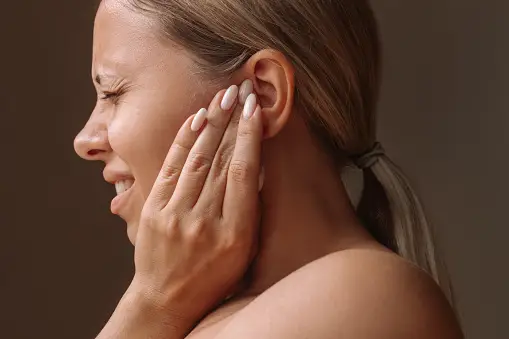
Tinnitus is characterized by the perception of sound in the ears or head without any external source. The symptoms of tinnitus can vary widely among individuals, depending on the underlying cause, severity, and type of tinnitus. Here are the primary symptoms associated with tinnitus:
1. Perception of Sound
- Ringing: A high-pitched ringing sound is one of the most common forms of tinnitus.
- Buzzing: A continuous buzzing noise that can be low or high in pitch.
- Humming: A low, steady hum that may resemble the sound of machinery.
- Hissing: A hissing sound similar to the noise of steam escaping.
- Clicking: A series of clicking noises, often rhythmic, that can come and go.
- Roaring: A roaring sound, like the ocean or wind.
- Whistling: A sharp, whistle-like sound.
- Musical Tones: In rare cases, some individuals may hear musical tones or melodies.
2. Variability of Symptoms
- Intermittent or Continuous: Tinnitus can be constant or it can come and go. For some, it is a persistent sound; for others, it may occur intermittently.
- Unilateral or Bilateral: The sounds can be heard in one ear (unilateral) or both ears (bilateral).
- Volume Fluctuations: The loudness of the tinnitus can vary, sometimes being very faint and at other times loud enough to interfere with hearing external sounds.
3. Associated Symptoms
- Hearing Loss: Many people with tinnitus also experience some degree of hearing loss. The hearing loss may be temporary or permanent, depending on the cause.
- Ear Fullness: A sensation of fullness or pressure in the ear, which can be uncomfortable and disconcerting.
- Ear Pain: Occasionally, tinnitus may be accompanied by pain in the ear, though this is less common.
- Balance Problems: Tinnitus can sometimes be associated with balance issues or dizziness, particularly if it is related to an inner ear condition.
- Headaches: Some individuals may experience headaches along with tinnitus, especially if it is caused by stress or tension.
- Sleep Disturbances: The persistent noise can interfere with the ability to fall asleep or stay asleep, leading to insomnia and fatigue.
- Concentration Difficulties: The constant noise can make it difficult to concentrate on tasks, affecting work and daily activities.
- Emotional Distress: Tinnitus can lead to significant emotional distress, including anxiety, irritability, and depression. The impact on mental health can vary based on the severity and chronic nature of the symptoms.
Causes of Tinnitus
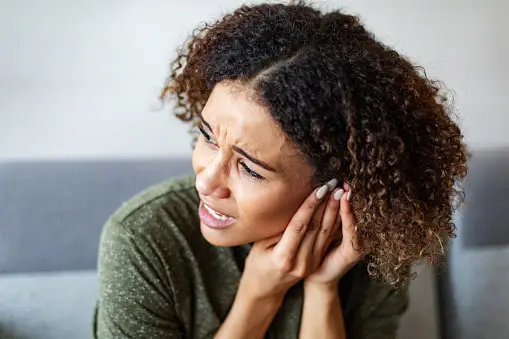
Tinnitus, the perception of sound without an external source, can be triggered by various underlying conditions and factors. Understanding these causes is crucial for effective diagnosis and management. Here are the primary causes of tinnitus:
1. Hearing Loss
- Age-Related Hearing Loss (Presbycusis):
- Description: Natural degeneration of hearing with age, typically starting around age 60.
- Impact: Leads to tinnitus as the auditory system’s sensitivity decreases.
- Noise-Induced Hearing Loss:
- Description: Damage to the hair cells in the inner ear due to prolonged exposure to loud noises.
- Sources: Loud music, industrial noise, firearms, explosions.
2. Ear Infections and Blockages
- Earwax Buildup:
- Description: Excessive earwax can block the ear canal, causing pressure and tinnitus.
- Resolution: Removing the earwax can alleviate symptoms.
- Ear Infections (Otitis Media or Otitis Externa):
- Description: Inflammation or infection of the middle or outer ear can cause tinnitus.
- Symptoms: Pain, fluid drainage, hearing loss.
- Eustachian Tube Dysfunction:
- Description: Blocked or dysfunctional eustachian tube leads to pressure changes in the middle ear.
- Causes: Allergies, colds, sinus infections.
3. Medications
- Ototoxic Drugs:
- Description: Certain medications can damage the inner ear and auditory nerve.
- Common Ototoxic Drugs: Aspirin (in high doses), certain antibiotics (like gentamicin), diuretics, quinine medications, some cancer drugs.
4. Head and Neck Injuries
- Trauma:
- Description: Injuries to the head or neck can affect the auditory pathways or the inner ear structures.
- Symptoms: Tinnitus often accompanied by headaches, dizziness, or balance problems.
5. Circulatory System Disorders
- Pulsatile Tinnitus:
- Description: Tinnitus that coincides with the heartbeat, often due to vascular issues.
- Causes: High blood pressure, atherosclerosis, arteriovenous malformations, tumors near the ear.
6. Other Ear Conditions
- Meniere’s Disease:
- Description: Inner ear disorder characterized by vertigo, tinnitus, and hearing loss.
- Cause: Excess fluid in the inner ear.
- Acoustic Neuroma:
- Description: A benign tumor on the auditory nerve that can cause tinnitus.
- Symptoms: Hearing loss, balance issues.
- Temporomandibular Joint (TMJ) Disorders:
- Description: Problems with the jaw joint can lead to tinnitus.
- Symptoms: Jaw pain, clicking sound, difficulty chewing.
7. Neurological Disorders
- Multiple Sclerosis:
- Description: A disease affecting the central nervous system, which can impact auditory pathways.
- Symptoms: Tinnitus, along with vision problems, motor issues.
- Head and Neck Tumors:
- Description: Tumors in the head and neck region can exert pressure on blood vessels and nerves.
- Impact: Can cause pulsatile tinnitus or other auditory symptoms.
8. Other Factors
- Stress and Anxiety:
- Impact: Psychological stress can exacerbate or trigger tinnitus symptoms.
- Mechanism: Stress affects blood flow and the autonomic nervous system, impacting the auditory system.
- Diet and Lifestyle:
- Stimulants: Excessive caffeine or nicotine use can worsen tinnitus.
- Diet: High-sodium diets can affect blood pressure and fluid balance, influencing tinnitus.
Risk Factors
Tinnitus can affect anyone, but certain risk factors increase the likelihood of developing this condition. Understanding these risk factors can help in identifying individuals who are more susceptible and aid in preventive measures. Here are the primary risk factors associated with tinnitus:
1. Age
- Age-Related Hearing Loss: As people age, the likelihood of experiencing tinnitus increases due to natural degeneration of the auditory system, particularly after the age of 60.
2. Exposure to Loud Noises
- Occupational Noise: Jobs that involve exposure to loud machinery, construction equipment, or industrial noise, such as factory work, construction, or military service.
- Recreational Noise: Regular exposure to loud music at concerts, clubs, or through personal audio devices at high volumes.
3. Ear Infections and Earwax Buildup
- Recurrent Ear Infections: Frequent infections can cause chronic inflammation and damage to the auditory system.
- Earwax Blockage: Excessive earwax can block the ear canal and cause tinnitus.
4. Hearing Loss
- Sensorineural Hearing Loss: Damage to the hair cells in the cochlea or the auditory nerve can lead to tinnitus.
5. Health Conditions
- Cardiovascular Diseases: Conditions such as high blood pressure, atherosclerosis, and arteriovenous malformations can affect blood flow to the ears and lead to tinnitus.
- Diabetes: Poor blood sugar control can damage the nerves, including those in the auditory system.
- Thyroid Disorders: Hypothyroidism and hyperthyroidism can both contribute to tinnitus.
6. Medications
- Ototoxic Drugs: Certain medications can damage the inner ear and cause tinnitus. These include:
- Nonsteroidal Anti-Inflammatory Drugs (NSAIDs): Such as aspirin and ibuprofen, especially in high doses.
- Antibiotics: Including aminoglycosides like gentamicin.
- Diuretics: Such as furosemide.
- Antimalarials: Including quinine.
- Chemotherapy Drugs: Such as cisplatin.
7. Head and Neck Injuries
- Trauma: Injuries to the head or neck can affect the auditory system, leading to tinnitus.
8. Jaw Misalignment and TMJ Disorders
- Temporomandibular Joint (TMJ) Disorders: Misalignment or inflammation of the jaw joint can contribute to tinnitus.
9. Lifestyle Factors
- Smoking: Tobacco use can increase the risk of tinnitus by affecting blood flow to the auditory system.
- Alcohol Consumption: Excessive alcohol intake can impact the central auditory pathways and exacerbate tinnitus symptoms.
- Caffeine: High caffeine intake can sometimes worsen tinnitus in susceptible individuals.
10. Psychological Factors
- Stress and Anxiety: High levels of stress and anxiety can trigger or worsen tinnitus, as these conditions affect blood flow and the nervous system.
11. Genetic Predisposition
- Family History: A family history of tinnitus or hearing loss can increase the likelihood of developing the condition.
12. Occupational and Recreational Activities
- Music Professionals: Musicians and other individuals who frequently work in loud environments are at higher risk.
- Pilots and Flight Attendants: Constant exposure to loud aircraft noise can contribute to tinnitus.
Diagnosis of Tinnitus
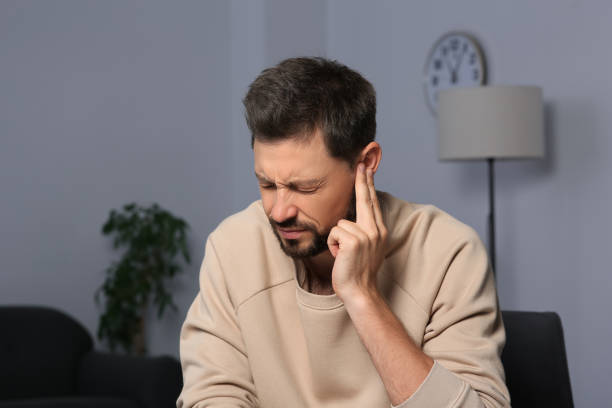
Diagnosing tinnitus involves a comprehensive evaluation by a healthcare provider to determine the underlying cause and appropriate treatment. The diagnosis process typically includes a detailed medical history, physical examination, and various tests to assess hearing and identify potential underlying conditions. Here are the key steps involved in diagnosing tinnitus:
1. Medical History and Symptom Assessment
- Detailed History: The healthcare provider will ask about the onset, duration, and characteristics of the tinnitus (e.g., ringing, buzzing, hissing).
- Exposure to Loud Noises: Inquiry about occupational and recreational exposure to loud noises.
- Medication Review: Identifying any medications being taken that could be ototoxic.
- Health Conditions: Discussion of any existing health conditions, such as cardiovascular disease, diabetes, thyroid disorders, or ear infections.
- Lifestyle Factors: Questions about smoking, alcohol consumption, and caffeine intake.
- Psychological Factors: Assessing levels of stress, anxiety, or depression.
2. Physical Examination
- Ear Examination: Using an otoscope to inspect the ear canal and eardrum for signs of earwax buildup, infection, or other abnormalities.
- Head and Neck Examination: Checking for signs of TMJ disorders, muscle spasms, or other issues that could be contributing to tinnitus.
3. Hearing Tests
- Pure Tone Audiometry: Measures hearing sensitivity across a range of frequencies to identify any hearing loss.
- Speech Audiometry: Assesses the ability to hear and understand speech.
- Tympanometry: Evaluates the function of the middle ear and the mobility of the eardrum.
- Acoustic Reflex Testing: Measures the reflexive contraction of the middle ear muscles in response to loud sounds.
- Otoacoustic Emissions (OAE): Tests the function of the outer hair cells in the cochlea.
4. Additional Tests
- Imaging Studies:
- MRI (Magnetic Resonance Imaging): Used to identify any structural abnormalities, tumors (e.g., acoustic neuroma), or other issues in the auditory pathways.
- CT (Computed Tomography) Scan: Helpful for visualizing the bones of the ear and surrounding structures, particularly in cases of trauma or chronic ear infections.
- Blood Tests: To check for underlying health conditions, such as thyroid disorders, diabetes, or nutritional deficiencies.
- Vascular Studies: If pulsatile tinnitus is suspected, ultrasound or angiography may be performed to evaluate blood flow and identify vascular abnormalities.
5. Specialized Tinnitus Tests
- Tinnitus Matching: Determining the pitch and loudness of the tinnitus sound by comparing it to external sounds.
- Minimum Masking Level (MML): Identifying the lowest level of external noise required to mask the tinnitus sound.
- Tinnitus Handicap Inventory (THI): A questionnaire to assess the impact of tinnitus on daily life and emotional well-being.
6. Referral to Specialists
- Audiologist: For detailed hearing assessments and management of tinnitus-related hearing issues.
- ENT (Ear, Nose, and Throat) Specialist: For further evaluation of ear-related issues and potential surgical interventions.
- Neurologist: If a neurological cause is suspected, such as multiple sclerosis or an acoustic neuroma.
- Psychologist or Psychiatrist: For managing the psychological impact of tinnitus, including stress, anxiety, and depression.
Treatment of Tinnitus
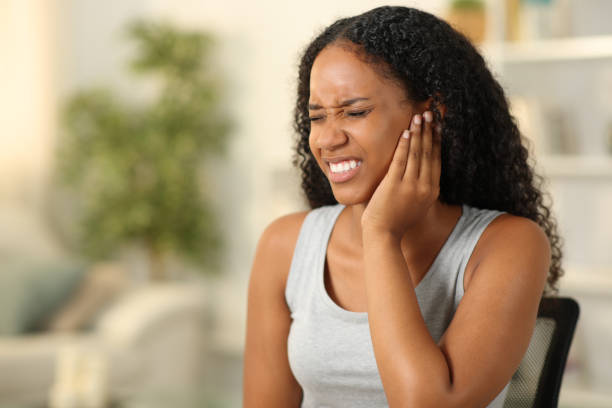
Treating tinnitus involves addressing the underlying causes, managing symptoms, and improving the quality of life for those affected. Since there is no single cure for tinnitus, a combination of therapies and lifestyle changes is often necessary. Here are the primary treatment options for tinnitus:
1. Medical Treatments
- Treating Underlying Conditions:
- Ear Infections and Wax Removal: Treating infections or removing earwax can relieve tinnitus.
- Medication Review: Adjusting or discontinuing ototoxic medications under medical supervision.
- Medications:
- Antidepressants: Tricyclic antidepressants (e.g., amitriptyline, nortriptyline) can help reduce tinnitus severity, especially if it is associated with anxiety or depression.
- Anti-anxiety Medications: Benzodiazepines (e.g., diazepam, clonazepam) may help reduce tinnitus-related anxiety, but they carry the risk of dependence.
- Anticonvulsants: Some studies suggest that certain anticonvulsant medications may help alleviate tinnitus symptoms, although more research is needed.
2. Hearing Aids and Sound Therapy
- Hearing Aids:
- Benefit: Amplify external sounds to make tinnitus less noticeable, especially for those with hearing loss.
- Custom Fitting: Devices are tailored to the individual’s hearing needs.
- Sound Therapy:
- White Noise Machines: Produce background noise to mask the tinnitus sounds, making them less perceptible.
- Environmental Sound Machines: Use nature sounds, like rain or ocean waves, to provide a soothing background noise.
- Tinnitus Maskers: Devices worn in the ear, similar to hearing aids, that produce constant low-level noise to mask tinnitus.
- Neuromodulation Devices: Deliver sounds at specific frequencies to disrupt tinnitus signals in the brain, offering potential relief.
3. Cognitive and Behavioral Therapies
- Cognitive Behavioral Therapy (CBT):
- Goal: Help patients change their reaction to tinnitus and reduce the distress it causes.
- Effectiveness: Proven to be effective in managing tinnitus-related anxiety and depression, improving overall quality of life.
- Tinnitus Retraining Therapy (TRT):
- Combination: Uses sound therapy and counseling to help patients habituate to tinnitus.
- Process: Involves regular sessions with a trained therapist over 12-24 months.
- Mindfulness and Relaxation Techniques:
- Meditation: Helps reduce stress and anxiety, which can exacerbate tinnitus.
- Progressive Muscle Relaxation: Reduces physical tension and stress.
4. Lifestyle and Home Remedies
- Stress Management:
- Relaxation Techniques: Yoga, meditation, and deep breathing exercises can help manage stress levels.
- Exercise: Regular physical activity can improve overall health and reduce stress.
- Diet and Nutrition:
- Caffeine and Alcohol: Reducing or eliminating caffeine and alcohol intake can help some people manage tinnitus symptoms.
- Healthy Diet: Maintaining a balanced diet rich in vitamins and minerals supports overall health.
- Hearing Protection:
- Avoiding Loud Noises: Use earplugs or earmuffs in noisy environments to protect hearing.
- Volume Control: Keep the volume of personal audio devices at safe levels.
5. Alternative and Complementary Therapies
- Acupuncture:
- Effectiveness: Some individuals find relief from tinnitus symptoms through acupuncture, although scientific evidence is mixed.
- Herbal Supplements:
- Ginkgo Biloba: Some studies suggest it may help reduce tinnitus symptoms, though evidence is not conclusive.
- Consultation: Always consult with a healthcare provider before starting any supplements.
- Biofeedback:
- Goal: Helps individuals control physiological functions to reduce tinnitus symptoms, particularly stress-related ones.
6. Support Groups and Education
- Support Groups:
- Benefit: Provides a platform to share experiences, coping strategies, and emotional support.
- Access: Many online and local support groups are available.
- Education:
- Understanding Tinnitus: Educating oneself about tinnitus can help reduce anxiety and improve management strategies.
Prevention of Tinnitus
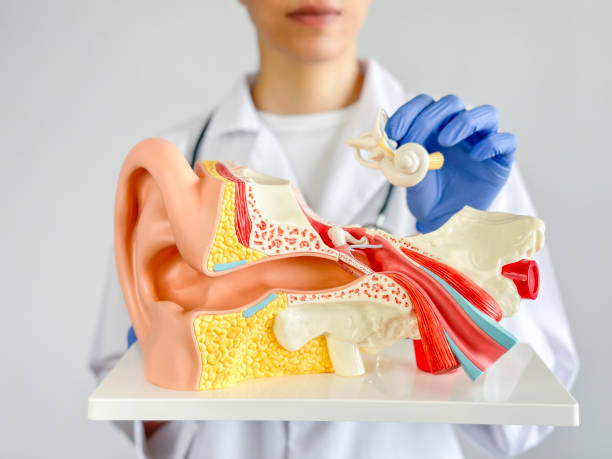
Preventing tinnitus involves taking proactive steps to protect your hearing and reduce the risk factors that can lead to this condition. Here are key strategies for preventing tinnitus:
1. Protect Your Hearing
- Avoid Loud Noises:
- Limit Exposure: Reduce the amount of time you spend in noisy environments, such as concerts, clubs, and loud workplaces.
- Volume Control: Keep the volume at safe levels when using personal audio devices. Follow the 60/60 rule: listen at no more than 60% volume for no more than 60 minutes at a time.
- Use Hearing Protection:
- Earplugs and Earmuffs: Use earplugs or earmuffs in noisy environments. Custom-fitted earplugs provide better protection and comfort.
- Noise-Canceling Headphones: These can help reduce the need to turn up the volume in noisy environments.
2. Maintain Ear Health
- Avoid Ear Canal Insertion:
- No Cotton Swabs: Do not use cotton swabs or other objects to clean the ear canal, as this can push earwax deeper and cause blockages or injury.
- Professional Cleaning: If you suspect earwax buildup, seek professional cleaning from a healthcare provider.
- Treat Ear Infections Promptly:
- Medical Attention: Seek prompt treatment for ear infections to prevent complications that could lead to tinnitus.
- Follow-Up: Ensure infections are fully resolved by attending follow-up appointments if necessary.
3. Manage Health Conditions
- Cardiovascular Health:
- Healthy Lifestyle: Maintain a healthy diet, exercise regularly, and manage stress to support cardiovascular health.
- Blood Pressure: Monitor and manage high blood pressure with the help of a healthcare provider.
- Diabetes Management:
- Blood Sugar Control: Keep blood sugar levels within the target range to prevent complications that can affect hearing.
- Thyroid Health:
- Regular Checkups: Have your thyroid function checked regularly, especially if you have symptoms of thyroid disorders.
4. Medications and Substances
- Avoid Ototoxic Medications:
- Consult Healthcare Provider: If you are taking medications that can affect hearing, discuss alternatives with your healthcare provider.
- Read Labels: Be aware of potential side effects of over-the-counter and prescription medications.
- Limit Stimulants:
- Caffeine and Alcohol: Reduce intake of caffeine and alcohol, as these substances can exacerbate tinnitus symptoms.
- Smoking: Avoid smoking and exposure to secondhand smoke, as it can impact blood flow to the ears and worsen tinnitus.
5. Reduce Stress
- Stress Management Techniques:
- Relaxation Exercises: Practice relaxation techniques such as deep breathing, yoga, and meditation.
- Regular Exercise: Engage in regular physical activity to reduce stress and improve overall well-being.
- Adequate Sleep: Ensure you get enough restful sleep to help manage stress and maintain overall health.
6. Regular Hearing Checkups
- Early Detection:
- Routine Exams: Have your hearing checked regularly, especially if you are at higher risk due to age, noise exposure, or other factors.
- Early Intervention: Address any hearing issues promptly to prevent further damage and complications.
Related Conditions
Tinnitus can be associated with several other health conditions, which can either contribute to its onset or exacerbate its symptoms. Understanding these related conditions can help in diagnosing and managing tinnitus effectively. Here are some of the primary conditions related to tinnitus:
1. Hearing Loss
- Age-Related Hearing Loss (Presbycusis):
- Description: Gradual loss of hearing that occurs as people age.
- Association: Often accompanied by tinnitus due to degeneration of auditory pathways.
- Noise-Induced Hearing Loss:
- Description: Hearing loss resulting from exposure to loud noises.
- Association: Damage to the hair cells in the inner ear can lead to both hearing loss and tinnitus.
2. Ear Infections and Conditions
- Otitis Media:
- Description: Infection of the middle ear.
- Association: Can cause inflammation and fluid buildup, leading to tinnitus.
- Otitis Externa:
- Description: Infection of the outer ear canal, also known as swimmer’s ear.
- Association: Inflammation and infection can lead to tinnitus symptoms.
- Earwax Buildup (Cerumen Impaction):
- Description: Accumulation of earwax that blocks the ear canal.
- Association: Can cause tinnitus by creating pressure and affecting hearing.
3. Neurological Disorders
- Acoustic Neuroma:
- Description: A benign tumor on the auditory nerve.
- Association: Can cause tinnitus, hearing loss, and balance problems.
- Multiple Sclerosis:
- Description: A disease of the central nervous system that affects nerve function.
- Association: Can lead to tinnitus, along with other neurological symptoms.
4. Cardiovascular and Circulatory Issues
- Hypertension (High Blood Pressure):
- Description: Elevated blood pressure levels.
- Association: Can cause or worsen tinnitus by affecting blood flow to the ears.
- Atherosclerosis:
- Description: Hardening and narrowing of the arteries.
- Association: Can lead to reduced blood flow to the inner ear, causing tinnitus.
- Arteriovenous Malformations (AVMs):
- Description: Abnormal connections between arteries and veins.
- Association: Can result in pulsatile tinnitus due to abnormal blood flow near the ears.
5. Metabolic and Endocrine Disorders
- Diabetes:
- Description: A condition that affects blood sugar levels and can cause nerve damage.
- Association: Diabetic neuropathy can affect the auditory nerves, leading to tinnitus.
- Thyroid Disorders:
- Hypothyroidism: Underactive thyroid can cause tinnitus, along with fatigue and weight gain.
- Hyperthyroidism: Overactive thyroid can also be associated with tinnitus, along with weight loss and anxiety.
6. Temporomandibular Joint (TMJ) Disorders
- Description: Problems with the jaw joint and muscles that control jaw movement.
- Association: TMJ disorders can cause tinnitus due to the close proximity of the jaw joint to the ear structures.
7. Mental Health Conditions
- Anxiety and Depression:
- Description: Emotional and psychological conditions that can affect overall well-being.
- Association: Stress, anxiety, and depression can exacerbate tinnitus symptoms and impact quality of life.
8. Head and Neck Trauma
- Description: Injuries to the head or neck, including concussions and whiplash.
- Association: Trauma can affect the auditory system, leading to tinnitus and other symptoms like headaches and dizziness.
Conclusion
Tinnitus is a prevalent and often distressing condition characterized by the perception of sound without an external source. It can manifest as ringing, buzzing, hissing, or other noises and can significantly impact an individual’s quality of life. Understanding the underlying causes and related conditions is crucial for effective diagnosis and management.
Various factors can contribute to tinnitus, including age-related and noise-induced hearing loss, ear infections, exposure to ototoxic medications, and underlying health conditions such as cardiovascular disease, diabetes, and thyroid disorders. Additionally, psychological factors like stress and anxiety can exacerbate tinnitus symptoms.
Diagnosing tinnitus involves a comprehensive evaluation, including a detailed medical history, physical examination, hearing tests, and potentially imaging studies to identify any structural abnormalities. Early and accurate diagnosis is essential for determining the most appropriate treatment approach.
While there is no cure for tinnitus, a range of treatment options can help manage symptoms and improve quality of life. These include medical treatments, hearing aids, sound therapy, cognitive and behavioral therapies, lifestyle changes, and alternative therapies. Preventive measures, such as protecting your hearing, maintaining ear health, managing stress, and avoiding ototoxic substances, can also play a significant role in reducing the risk of tinnitus.
If you experience persistent or bothersome tinnitus, seeking professional medical advice is crucial to explore suitable treatment options and address any underlying health conditions. By adopting a proactive approach to management and prevention, individuals with tinnitus can achieve better control over their symptoms and enhance their overall well-being.
